- Clone
- A1 (See other available formats)
- Regulatory Status
- RUO
- Workshop
- HCDM listed
- Other Names
- gp80, E-ATPDase, NTPDase-1, ecto-apyrase, Ec3.6.1.5
- Isotype
- Mouse IgG1, κ
- Ave. Rating
- Submit a Review
- Product Citations
- publications
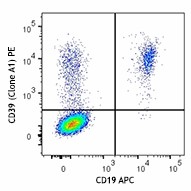
-

Human peripheral blood lymphocytes were stained with CD19 APC and CD39 (clone A1) PE (top) or mouse IgG1, κ PE isotype control (bottom). -

-

Confocal image of human lymph node sample acquired using the IBEX method of highly multiplexed antibody-based imaging: CD117 (cyan) in Cycle 6, CD39 (blue) in Cycle 12, and CD94 (magenta) in Cycle 13. Images are prepared from formalin fixed paraffin embedded human kidney sections. Images are courtesy of Drs. Andrea J. Radtke and Ronald N. Germain of the Center for Advanced Tissue Imaging (CAT-I) in the National Institute of Allergy and Infectious Diseases (NIAID, NIH).
| Cat # | Size | Price | Quantity Check Availability | Save | ||
|---|---|---|---|---|---|---|
| 328207 | 25 tests | $108 | ||||
| 328208 | 100 tests | $237 | ||||
Human CD39 is an integral membrane protein with two transmembrane domains. It exists as a homotetramer. Expression of CD39 is found on activated lymphocytes, a subset of T cells and B cells, and dendritic cells with weak staining on monocytes and granulocytes. CD39 and CD73 have been found on regulatory T cells, specifically the effector/memory like T cells. CD39 can hydrolyze both nucleoside triphosphates and diphosphates. CD39 is the dominant ecto nucleotidase of vascular and placental trophoblastic tissues and appears to modulate the functional expression of type 2 purinergic (P2) G protein coupled receptors (GPCRs). CD39 has intrinsic ecto-ATPase activity. Expression of CD39 is induced on T cells and increased on B cells as a late activation antigen.
Product DetailsProduct Details
- Verified Reactivity
- Human, Cynomolgus, Rhesus
- Antibody Type
- Monoclonal
- Host Species
- Mouse
- Immunogen
- PHA activated human lymphocytes
- Formulation
- Phosphate-buffered solution, pH 7.2, containing 0.09% sodium azide and BSA (origin USA)
- Preparation
- The antibody was purified by affinity chromatography, and conjugated with PE under optimal conditions.
- Concentration
- Lot-specific (to obtain lot-specific concentration and expiration, please enter the lot number in our Certificate of Analysis online tool.)
- Storage & Handling
- The antibody solution should be stored undiluted between 2°C and 8°C, and protected from prolonged exposure to light. Do not freeze.
- Application
-
FC - Quality tested
SB - Reported in the literature, not verified in house - Recommended Usage
-
Each lot of this antibody is quality control tested by immunofluorescent staining with flow cytometric analysis. For flow cytometric staining, the suggested use of this reagent is 5 µl per million cells in 100 µl staining volume or 5 µl per 100 µl of whole blood.
- Excitation Laser
-
Blue Laser (488 nm)
Green Laser (532 nm)/Yellow-Green Laser (561 nm)
- Application Notes
-
The A1 antibody binds to the human CD39 cell surface antigen and has been shown to block MHC independent target cell recognition by hapten-specific CTL. Additional reported applications (for the relevant formats) include: in vitro CD39 blockade3, immunofluorescence4, immunohistochemistry6, and spatial biology (IBEX)7,8. The Ultra-LEAF™ purified antibody (Endotoxin < 0.01 EU/µg, Azide-Free, 0.2 µm filtered) is recommended for blocking assays (contact our custom solutions team).
- Additional Product Notes
-
Iterative Bleaching Extended multi-pleXity (IBEX) is a fluorescent imaging technique capable of highly-multiplexed spatial analysis. The method relies on cyclical bleaching of panels of fluorescent antibodies in order to image and analyze many markers over multiple cycles of staining, imaging, and, bleaching. It is a community-developed open-access method developed by the Center for Advanced Tissue Imaging (CAT-I) in the National Institute of Allergy and Infectious Diseases (NIAID, NIH).
-
Application References
(PubMed link indicates BioLegend citation) -
- Aversa GG, et al. 1988. Transplant. P. 20:4952.
- Aversa GG, et al. 1989. Transplant. P. 21:34950.
- Borsellino G, et al. 2007. Blood. 110:1225. (Block)
- Stockl J, et al. 2001. J. Immunol. 167:2724. (IF)
- Sestak K, et al. 2007. Vet. Immunol. Immunopathol. 119:21.
- Lyck L, et al. 2008. J. Histochem. Cytochem. 56:201. (IHC)
- Radtke AJ, et al. 2020. Proc Natl Acad Sci USA. 117:33455-33465. (SB) PubMed
- Radtke AJ, et al. 2022. Nat Protoc. 17:378-401. (SB) PubMed
- Product Citations
-
- RRID
-
AB_940427 (BioLegend Cat. No. 328207)
AB_940429 (BioLegend Cat. No. 328208)
Antigen Details
- Distribution
-
Activated lymphocytes, and also on a subset of T cells, regulatory T cells, B cells, and dendritic cells.
- Cell Type
- B cells, Dendritic cells, Lymphocytes, T cells, Tregs
- Biology Area
- Immunology
- Molecular Family
- CD Molecules
- Gene ID
- 953 View all products for this Gene ID
- UniProt
- View information about CD39 on UniProt.org
Related FAQs
- What type of PE do you use in your conjugates?
- We use R-PE in our conjugates.
- If an antibody clone has been previously successfully used in IBEX in one fluorescent format, will other antibody formats work as well?
-
It’s likely that other fluorophore conjugates to the same antibody clone will also be compatible with IBEX using the same sample fixation procedure. Ultimately a directly conjugated antibody’s utility in fluorescent imaging and IBEX may be specific to the sample and microscope being used in the experiment. Some antibody clone conjugates may perform better than others due to performance differences in non-specific binding, fluorophore brightness, and other biochemical properties unique to that conjugate.
- Will antibodies my lab is already using for fluorescent or chromogenic IHC work in IBEX?
-
Fundamentally, IBEX as a technique that works much in the same way as single antibody panels or single marker IF/IHC. If you’re already successfully using an antibody clone on a sample of interest, it is likely that clone will have utility in IBEX. It is expected some optimization and testing of different antibody fluorophore conjugates will be required to find a suitable format; however, legacy microscopy techniques like chromogenic IHC on fixed or frozen tissue is an excellent place to start looking for useful antibodies.
- Are other fluorophores compatible with IBEX?
-
Over 18 fluorescent formats have been screened for use in IBEX, however, it is likely that other fluorophores are able to be rapidly bleached in IBEX. If a fluorophore format is already suitable for your imaging platform it can be tested for compatibility in IBEX.
- The same antibody works in one tissue type but not another. What is happening?
-
Differences in tissue properties may impact both the ability of an antibody to bind its target specifically and impact the ability of a specific fluorophore conjugate to overcome the background fluorescent signal in a given tissue. Secondary stains, as well as testing multiple fluorescent conjugates of the same clone, may help to troubleshoot challenging targets or tissues. Using a reference control tissue may also give confidence in the specificity of your staining.
- How can I be sure the staining I’m seeing in my tissue is real?
-
In general, best practices for validating an antibody in traditional chromogenic or fluorescent IHC are applicable to IBEX. Please reference the Nature Methods review on antibody based multiplexed imaging for resources on validating antibodies for IBEX.
Other Formats
View All CD39 Reagents Request Custom ConjugationCustomers Also Purchased
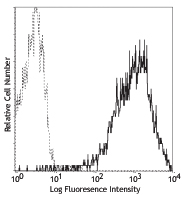
Compare Data Across All Formats
This data display is provided for general comparisons between formats.
Your actual data may vary due to variations in samples, target cells, instruments and their settings, staining conditions, and other factors.
If you need assistance with selecting the best format contact our expert technical support team.
-
Brilliant Violet 510™ anti-human CD39
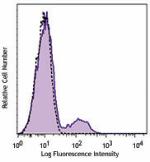
Human peripheral blood lymphocytes were stained with CD39 (c... -
Brilliant Violet 421™ anti-human CD39
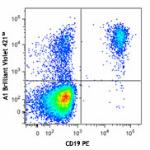
Human peripheral blood lymphocytes were stained with CD19 PE... 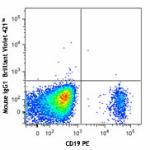
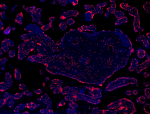
Human paraffin-embedded placenta tissue slice was prepared w... -
Purified anti-human CD39
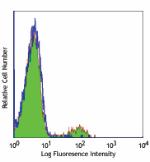
Human peripheral blood lymphocytes stained with purified A1,... -
Biotin anti-human CD39
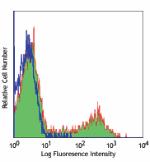
Human peripheral blood lymphocytes stained with biotinylated... -
FITC anti-human CD39
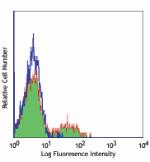
Human peripheral blood lymphocytes stained with A1 FITC -
PE anti-human CD39
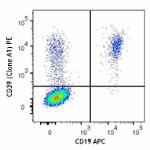
Human peripheral blood lymphocytes were stained with CD19 AP... 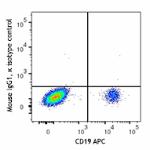
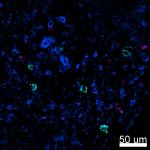
Confocal image of human lymph node sample acquired using the... -
APC anti-human CD39
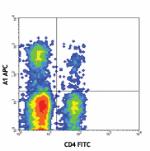
Human peripheral blood lymphocytes were stained with anti-hu... 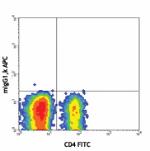
-
PE/Cyanine7 anti-human CD39
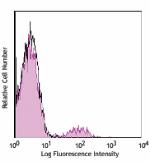
Human peripheral blood lymphocytes stained with A1 PE/Cyanin... 
Human peripheral blood lymphocytes were stained with anti-hu... -
PerCP/Cyanine5.5 anti-human CD39
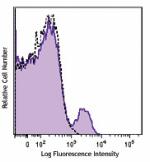
Human peripheral blood lymphocytes were stained with CD39 (c... -
Purified anti-human CD39 (Maxpar® Ready)
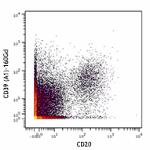
Human PBMCs stained with 147Sm-anti-CD20 (2H7) and 160Gd-ant... 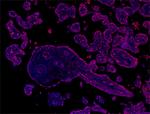
Human paraffin-embedded placenta tissue slice was stained wi... -
PE/Dazzle™ 594 anti-human CD39
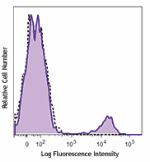
Human peripheral blood lymphocytes were stained with CD39 (c... -
APC/Cyanine7 anti-human CD39

Human peripheral blood lymphocytes were stained with CD19 FI... -
Brilliant Violet 711™ anti-human CD39
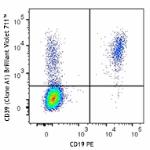
Human peripheral blood lymphocytes were stained with CD19 PE... 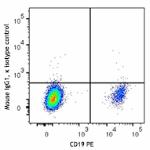
-
APC/Fire™ 750 anti-human CD39
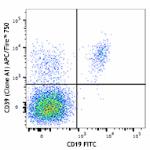
Human peripheral blood lymphocytes were stained with CD19 FI... 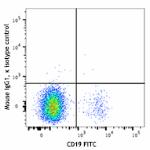
-
Alexa Fluor® 594 anti-human CD39
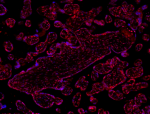
Human paraffin-embedded placenta tissue slice was prepared w... -
TotalSeq™-A0176 anti-human CD39
-
Brilliant Violet 605™ anti-human CD39

Human peripheral blood lymphocytes were stained with CD19 Al... -
TotalSeq™-C0176 anti-human CD39
-
Brilliant Violet 785™ anti-human CD39

Human peripheral blood lymphocytes were stained with CD19 Pa... -
TotalSeq™-B0176 anti-human CD39
-
TotalSeq™-D0176 anti-human CD39
-
PE/Fire™ 810 anti-human CD39 Antibody

Human peripheral blood lymphocytes were stained with anti-hu... -
PE/Cyanine5 anti-human CD39

Human peripheral blood lymphocytes were stained with anti-hu... -
PerCP/Fire™ 806 anti-human CD39

Human peripheral blood lymphocytes were stained with anti-hu... -
Spark NIR™ 685 anti-human CD39

Human peripheral blood lymphocytes were stained with anti-hu... -
Spark Red™ 718 anti-human CD39 (Flexi-Fluor™)
-
PE/Fire™ 744 anti-human CD39

Human peripheral blood lymphocytes were stained with anti-hu... -
Alexa Fluor® 700 anti-human CD39

Human peripheral blood lymphocytes were stained with anti-hu... -
Spark Blue™ 574 anti-human CD39 (Flexi-Fluor™)
-
Spark Blue™ 550 anti-human CD39 (Flexi-Fluor™)
-
Alexa Fluor® 647 anti-human CD39

Human peripheral blood lymphocytes were stained with anti-hu... 
IHC staining of Alexa Fluor® 647 anti-human CD39 (clone A1) ... -
Spark PLUS UV395™ anti-human CD39

Human peripheral blood lymphocytes were stained with anti-hu...
 Login/Register
Login/Register 










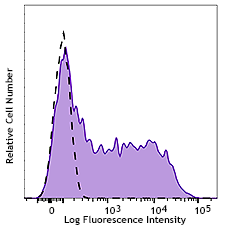





Follow Us